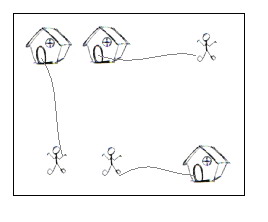POJ 2195 Going Home(BFS+KM求最小权值)
Description:
On a grid map there are n little men and n houses. In each unit time, every little man can move one unit step, either horizontally, or vertically, to an adjacent point. For each little man, you need to pay a $1 travel fee for every step he moves, until he enters a house. The task is complicated with the restriction that each house can accommodate only one little man.
Your task is to compute the minimum amount of money you need to pay in order to send these n little men into those n different houses. The input is a map of the scenario, a '.' means an empty space, an 'H' represents a house on that point, and am 'm' indicates there is a little man on that point.
![]()
You can think of each point on the grid map as a quite large square, so it can hold n little men at the same time; also, it is okay if a little man steps on a grid with a house without entering that house.
Your task is to compute the minimum amount of money you need to pay in order to send these n little men into those n different houses. The input is a map of the scenario, a '.' means an empty space, an 'H' represents a house on that point, and am 'm' indicates there is a little man on that point.

You can think of each point on the grid map as a quite large square, so it can hold n little men at the same time; also, it is okay if a little man steps on a grid with a house without entering that house.
Input:
There are one or more test cases in the input. Each case starts with a line giving two integers N and M, where N is the number of rows of the map, and M is the number of columns. The rest of the input will be N lines describing the map. You may assume both N and M are between 2 and 100, inclusive. There will be the same number of 'H's and 'm's on the map; and there will be at most 100 houses. Input will terminate with 0 0 for N and M.
Output:
For each test case, output one line with the single integer, which is the minimum amount, in dollars, you need to pay.
Sample Input:
2 2 .m H. 5 5 HH..m ..... ..... ..... mm..H 7 8 ...H.... ...H.... ...H.... mmmHmmmm ...H.... ...H.... ...H.... 0 0
Sample Output:
2 10 28
题意:有n个人和n个房子,现在要求这n个人分别回到n个房子所需要的最短路程是多少,地图中'.'代表空地,'m'代表人,'H'代表房子,m和H是对应的
那么就必须先用BFS求得每个人到每个房子的最短距离,然后用KM算法计算每个人与房子的完备匹配得到最小权值
#include<stdio.h> #include<queue> #include<string.h> #include<algorithm> #define INF 0x3f3f3f3f #define N 110 using namespace std; char Map[N][N]; int n, m, K; int G[N][N], s[N], lx[N], ly[N], no[N][N]; //no数组存放的是在第i行第j列的房子的序号 int use[N], visx[N], visy[N], V[N][N]; int dir[4][2] = { {1,0}, {-1,0}, {0,1}, {0,-1} }; struct node { int x, y, z; }; void BFS(int x, int y, int k) { int nx, ny, i; memset(V, 0, sizeof(V)); queue<node>Q; node now, next; now.x = x; now.y = y; now.z = 0; Q.push(now); while (!Q.empty()) { now = Q.front(); Q.pop(); if (Map[now.x][now.y] == 'H') //每遇到一个房子,就将第k个人到这所房子的距离记录下来 G[k][no[now.x][now.y]] = -now.z; //因为要求最小权值,所以只要把两点间权值改为其相反数,再用KM求其最大匹配即可 for (i = 0; i < 4; i++) { next.x = nx = now.x + dir[i][0]; next.y = ny = now.y + dir[i][1]; if (nx >= 0 && nx < n && ny >= 0 && ny < m && !V[nx][ny]) { V[nx][ny] = 1; next.z = now.z + 1; Q.push(next); } } } } int Find(int u) { int i; visx[u] = 1; for (i = 1; i <= K; i++) { if (!visy[i] && G[u][i] == lx[u]+ly[i]) { visy[i] = 1; if (!use[i] || Find(use[i])) { use[i] = u; return 1; } } else s[i] = min(s[i], (lx[u]+ly[i])-G[u][i]); } return 0; } int KM() { int i, j, ans = 0, d; memset(lx, 0, sizeof(lx)); memset(ly, 0, sizeof(ly)); for (i = 1; i <= K; i++) for (j = 1; j <= K; j++) lx[i] = max(lx[i], G[i][j]); for (i = 1; i <= K; i++) { for (j = 1; j <= K; j++) s[j] = INF; while (1) { memset(visx, 0, sizeof(visx)); memset(visy, 0, sizeof(visy)); if (Find(i)) break; d = INF; for (j = 1; j <= K; j++) { if (!visy[j]) d = min(s[j], d); } for (j = 1; j <= K; j++) { if (visx[j]) lx[j] -= d; if (visy[j]) ly[j] += d; } } } for (i = 1; i <= K; i++) ans -= G[use[i]][i]; //计算结果时不要忘记G数组存放的是负数 return ans; } int main () { int i, j, k, ans, t; while (scanf("%d%d", &n, &m), n+m) { k = 0; t = 0; memset(G, 0, sizeof(G)); memset(use, 0, sizeof(use)); for (i = 0; i < n; i++) scanf("%s", Map[i]); for (i = 0; i < n; i++) for (j = 0; j < m; j++) if (Map[i][j] == 'H') no[i][j] = ++t; for (i = 0; i < n; i++) { for (j = 0; j < m; j++) { if (Map[i][j] == 'm') { BFS(i, j, ++k); //每遇到一个人就进行BFS,得到这个人到每个房子的距离 K = k; //K是人的序号 } } } ans = KM(); printf("%d\n", ans); } return 0; }


 浙公网安备 33010602011771号
浙公网安备 33010602011771号